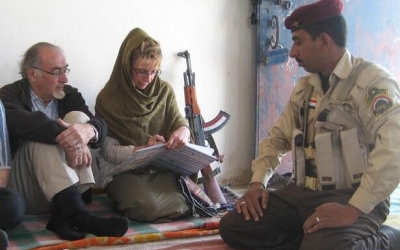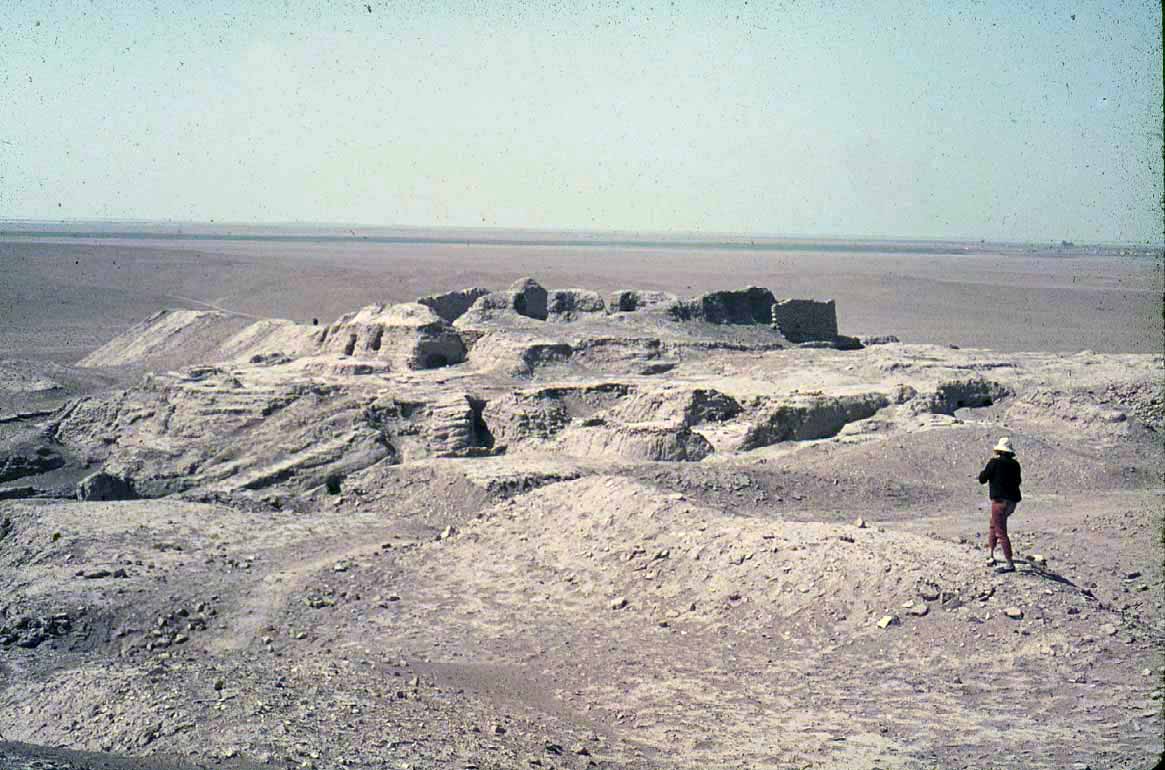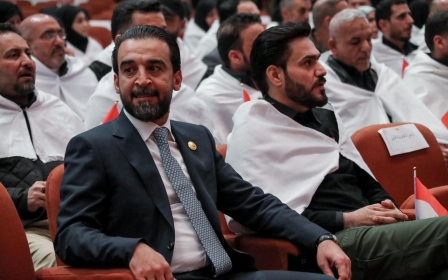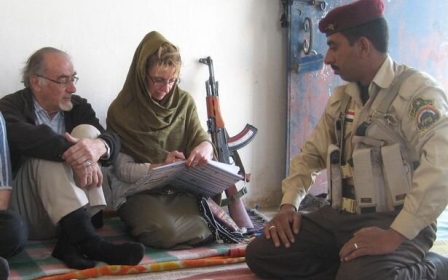Iraq: British and German tourists detained in Baghdad accused of smuggling antiquities
Two British and German tourists accused of trying to smuggle antiquities out of Iraq have been detained in Baghdad and possibly face the death penalty or imprisonment, with relatives accusing the travel company and embassy authorities of letting the pair down.
The daughter of one of the two men arrested, 66-year old British retired geologist James Fitton, told Middle East Eye that her father had been failed several times by the tour company and said the UK government had so far provided little assistance.
The two tourists were held at Baghdad airport at the end of a tour organised by Geoff Hann, an 85-year-old veteran who himself had a stroke at the end of the trip, was hospitalised, contracted Covid-19 and died on 22 April in Baghdad’s al-Yarmouk hospital, where he had been confined for the preceding month.
'They made no attempt to conceal anything because they didn’t know anything was wrong'
- Leila Louise Fitton
Attempts by Hann's family and friends, including via an online fundraiser, to organise medical evacuation were thwarted after the arrest on 20 March of Fitton and the German tourist.
The Iraqi courts issued an order forbidding Hann from leaving the country before being questioned, despite the stroke leaving him partially paralysed, unable to speak and most probably cognitively impaired.
New MEE newsletter: Jerusalem Dispatch
Sign up to get the latest insights and analysis on Israel-Palestine, alongside Turkey Unpacked and other MEE newsletters
Although for most of his month-long hospitalisation Hann was only wanted for questioning, it is understood that he was placed under arrest the day before he died.
Iraqi law states that anyone who exports or intends to export antiquities from the country can be punished by execution, imprisonment or a fine.
Iraq has been plagued by the looting and theft of antiquities for decades, particularly since the US-led 2003 invasion. Although local media cover sporadic arrests made by Iraqi security forces in relation to antiquities thefts, reports of actual sentencing are rare.
Ancient site
The tour group was found with 32 artefacts - believed to be small fragments with little to no commercial value - at the airport, and the two detained tourists are facing serious allegations of antiquities smuggling.
Leila Louise Fitton, daughter of James Fitton, told MEE that her father's arrest was completely unjust and that he had been let down by the travel company and was not properly informed of the risks he faced visiting historical sites.
She said that he and other members of the tour group had found fragments of stones in piles on the ground at the ancient historical site of Eridu in southern Iraq, "in the open, unguarded and with no signage warning against the removal of any debris”.
Eridu, which is largely unexcavated, is considered one of the earliest cities in the world, and pottery shards dating back thousands of years can be seen on its surface.
Normally off-limits to visitors, Eridu has no signs, although the nearby Ziggurat of Ur, also included in the group’s itinerary, has signs in English and Arabic warning visitors not to pick up any artefacts.
"We would like to clarify that, had my father been aware of the Iraqi government’s hardline stance on the removal of broken shards of material from sites in Iraq, he would of course not have taken anything with him. His innocence is clear - the items were not obscured in their luggage and they made no attempt to conceal anything because they didn’t know anything was wrong," said Leila, adding that it was Fitton's first trip to the country.
Hinterland Travel declined to comment.
The company does not operate independently but works directly with Iraq’s tourism ministry, which confirms itineraries, issues permissions and provides accompanying staff.
“Everything’s always arranged with the Ministry of Tourism, which agrees the proposed sites, gives a ‘kitab’ [permission document], and provides the minibus, a driver, a guide/translator and sometimes security,” Hann’s close friend Tina Townsend-Greaves, who accompanied him on several previous tours, told MEE.
“The tour group cannot go anywhere without them, or anywhere not written on the kitab.”
Fitton’s family told MEE the 32 artefacts found in the tour group’s luggage were originally all attributed to him, as he had been looking after everyone’s baggage at the airport after Hann suffered a collapse.
They said Fitton’s Iraqi lawyer and airport CCTV footage had subsequently established that 12 of the seized pieces were in his luggage. They claimed the remaining 20 were in the luggage of Hann and his South African assistant tour guide, apparently prompting the judge overseeing the case to issue arrest warrants for both Hann and his assistant, who had already left the country.

Any alleged role of the German tourist is unclear, but it is understood that he remains in custody, facing the same smuggling charges as Fitton. Sources from Germany’s Federal Foreign Office told MEE they were aware of the case and that their embassy in Baghdad was providing consular assistance.
Leila said that her father believed that Hann's deteriorating health had been a factor in why security protocols had slipped during the tour. She said tour leaders actively collected the same shards of pottery and stones as souvenirs and were told it would not be an issue leaving Iraq as the shards "had no economic or historical value”.
"Whilst we want to be clear that we wish no ill to the staff of Hinterlands Tours, intend no legal action, and have nothing but sympathy for the sad passing of Geoff Hann, we feel that our family has been let down," she said.
"Interviews and comment given by Hinterlands Tours staff who were not present on the trip have given the impression that my father was in some way responsible for the situation faced by Geoff Hann, and that he and the German citizen were somehow involved in premeditated criminal enterprise - nothing could be further from the truth as I believe we’ve made abundantly clear," Leila Fitton added.
Townsend-Greaves said Hann’s poor health rendered him unable to walk without a stick, leading her to believe he could not have walked around sites such as Eridu, which comprise rough and undulating terrain.
“I can’t imagine Geoff would have picked up anything at any site because his walking had become so bad, and also because he had been visiting Iraq for so many years. I don’t know why he would now suddenly start picking up pieces of pottery, but I wasn’t there so I don’t know for sure what happened,” she said.
Hann apparently usually verbally warned visitors against taking any souvenirs from historic sites, something he also reiterated in the Iraq guidebook he co-authored.
Hann's assistant tour guide, Glenis Gilespie, told MEE that she felt it inappropriate to comment while legal matters were unresolved with the detained tourists.
Criticism of UK authorities
Leila said her family had so far had very little support from the UK authorities.
'We have had more engagement from the Malaysian government - my father is not even a citizen of this country - than we have from the British'
- Leila Louise Fitton
The family had been told, she said, that the foreign office would "not intervene to support my father for fear of upsetting the Iraqi authorities".
In a statement, a Foreign Office spokesperson told MEE that they were "providing consular support to a British national in Iraq and are in contact with the local authorities."
They added, however, that the UK "cannot interfere in the legal systems of other countries, just as we would not expect them to interfere in ours" while stressing their opposition to the death penalty in all circumstances.
Wera Hobhouse, the MP for Leila's home constituency of Bath, on Tuesday raised a complaint in the British House of Commons, saying she had contacted Amanda Milling, the minister for Asia and the Middle East, on the subject of Fitton's imprisonment, but not received "so much as a holding response from the minister's private office" until Monday.
House of Commons Speaker Lindsay Hoyle echoed her criticism in response, saying he would "put on record that it is unhelpful when we write to departments and they do not answer letters in a timely way".
"We have had more engagement from the Malaysian government - my father is not even a citizen of that country - than we have from the British," said Leila. Fitton's wife is Malaysian.
"They are content, it seems, to leave him to his fate unless we can convince them to change their approach."
Middle East Eye delivers independent and unrivalled coverage and analysis of the Middle East, North Africa and beyond. To learn more about republishing this content and the associated fees, please fill out this form. More about MEE can be found here.





